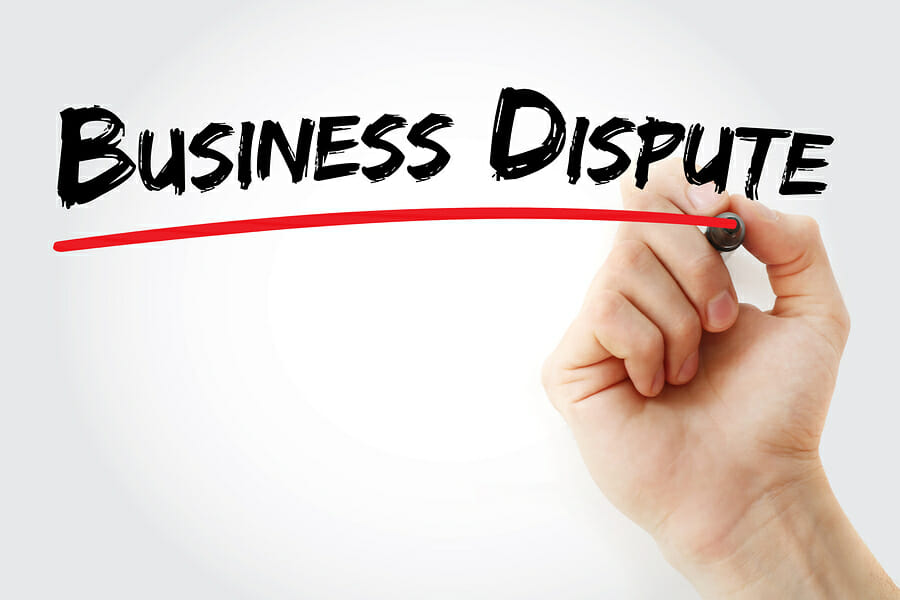Key Points
- Knowing how to resolve disputes is key to saving time and money for small businesses.
- Typical legal disputes involve issues with partnerships, breaches of contract, and disagreements with employees.
- Proactive dispute prevention can include having clear contracts and good communication.
- Early resolution methods like negotiation and mediation can often avoid the need for litigation.
- Getting advice from a small business lawyer early on can give you a strategic edge in resolving disputes.
Guide & Tips for Handling Legal Disputes in Small Businesses
The Importance of Dispute Resolution for Small Businesses
Running a small business is full of challenges, and legal disputes can be some of the hardest. These disputes can take up your time, resources, and energy, distracting you from growing your business. That’s why it’s so important to know how to handle legal disputes effectively.

Handling disputes in a fast and effective manner can spare you a lot of stress. It can also help maintain your business relationships and image. Above all, it keeps you from expensive lawsuits, which can be a financial strain on your small business.
Legal Disputes Often Encountered by Small Businesses
Small businesses often find themselves dealing with legal disputes. By understanding the most common types, you can be better prepared. Here are some of the most common disputes:
- Disputes Among Partners: When business partners can’t agree on responsibilities, roles, and how to split profits.
- Contract Breaches: When one party doesn’t meet their obligations in a contract.
- Disputes with Employees: When employees have issues with pay, work conditions, or if they were wrongfully terminated.
- Disputes Over Intellectual Property: When there are disagreements about copyrights, patents, or trademarks.
- Complaints from Customers: When customers aren’t happy with your products or services and take legal action.
How to Keep Legal Disputes from Happening
It’s always better to stop something from happening in the first place than to repair the damage after it has happened. Here are some steps you can take to keep legal disputes from happening:
- Unambiguous Contracts: Ensure all contracts are specific and unambiguous. This is applicable to agreements with partners, employees, and clients.
- Open Communication: Maintain open communication with all stakeholders. Address issues before they become major problems.
- Staff Training: Educate your staff about company policies and legal requirements to avoid confusion.
- Periodic Reviews: Frequently review your contracts and policies to ensure they are current and in compliance with the law.
By implementing these proactive measures, you can minimize the risk of disputes and ensure your business operates smoothly.
How to Effectively Handle Legal Disputes
No matter how hard you try, disputes are sometimes unavoidable. Here are some steps to handle them effectively: For more insights, check out these small business owner tips.
- Keep Your Cool: Don’t let your emotions get the best of you.
- Collect Evidence: Gather all necessary documents and information about the dispute.
- Define Your Goals: Understand the main issues and what you hope to achieve.
- Get Legal Advice: Speak to a legal expert to understand your options and the best way to proceed.
By following these steps, you can handle the dispute in a methodical and efficient way.
Strategies for Early Resolution
Settling disputes as soon as possible can conserve your resources. Here are some strategies you might want to think about, including small business resilience stories that highlight overcoming adversity.
- Negotiation: Attempt to find a solution that both parties can agree on by speaking directly with the other party.
- Mediation: Bring in a neutral third party to help guide discussions and find a resolution.
- Arbitration: Have an arbitrator make a final decision on the dispute.
These early resolution strategies can often stop litigation from being necessary and help keep business relationships intact.
Conflicts are a natural part of operating a business, but they don’t have to be a source of constant stress. By taking initiative, staying knowledgeable, and getting the proper guidance, you can manage conflicts efficiently and keep your business running smoothly.
How Small Business Attorneys Aid in Resolving Disputes
Small business attorneys are crucial in dispute resolution. They offer knowledge and skills, assisting you in managing the intricacies of the legal system. A competent attorney can offer tactical advice, represent you during discussions, and fight for your rights in court if needed. For more insights on overcoming challenges, read these small business resilience stories.

First and foremost, an attorney can aid in your comprehension of the legal consequences of your choices and behavior. They have the ability to examine contracts, pinpoint possible legal problems, and provide guidance on the most effective strategy to prevent disputes. If a dispute arises, they can assist you in collecting evidence, building your case, and negotiating a settlement. For more insights on navigating business challenges, check out these small business resilience stories.
Having a reliable attorney on your team allows you to concentrate on managing your business without worry.
How Small Business Owners Can Negotiate Effectively
Negotiation is usually the initial step in resolving a conflict. Here are some tips to help you become a successful negotiator:
- Do Your Homework: Get a clear understanding of the dispute, know what you want to achieve, and try to understand the other party’s point of view.
- Keep Your Cool and Stay Professional: Don’t let your emotions get the better of you and always behave in a professional manner during negotiations.
- Practice Active Listening: Really listen to what the other party is saying and show them that you understand their viewpoint.
- Be Open to Compromise: Be prepared to make concessions and look for alternative solutions that could be acceptable to both sides.
- Concentrate on Interests, Not Positions: Try to identify the real interests behind each party’s stance and aim to find a solution that meets those interests.
Adopting these tactics can help you to reach a win-win agreement and avoid having to go to court.
Alternative Dispute Resolution Methods: Mediation and Arbitration
Mediation and arbitration are alternative dispute resolution methods that can be more efficient and cost-effective than litigation. Here’s a closer look at each option:
Mediation: Mediation is a process where a neutral third party (the mediator) assists the parties involved in a dispute to communicate and negotiate a resolution. The mediator does not make the decision but instead guides the discussion to help the parties come to an agreement. Mediation is voluntary and non-binding, which means that either party can leave the process at any point.
Arbitration: This is a process where a neutral third party (the arbitrator) hears from both sides and makes a binding decision. It is a more formal process than mediation, but less formal than a court trial. Arbitration can be quicker and cheaper than going to court, but the decision of the arbitrator is final and can only be challenged in very limited circumstances.
Key Legal Factors
There are several key factors to consider when dealing with legal disputes:
- Paperwork: Maintain comprehensive records of all communications, contracts, and agreements related to the dispute.
- Timelines: Stay informed of any legal timelines, such as statutes of limitations, that may affect your case.
- Privacy: Think about the privacy of the dispute and any potential impact on your business reputation.
- Expenses: Assess the potential expenses of litigation, including legal fees, court costs, and the impact on your business operations.
- Legal Guidance: Obtain guidance from a qualified lawyer to understand your rights and options.
Case Studies: Real-World Scenarios
Learning from real-world scenarios can provide valuable insights into how to handle legal disputes. Here are two case studies:
Real-life Example 1: Disagreement in a Partnership
A small technology-based startup experienced a partnership disagreement when one partner decided to leave the business. The other partners were worried about how this would affect the business’s operations and intellectual property. They decided to seek mediation, which allowed them to agree on the terms of the partner’s departure and the transfer of ownership. The mediation process helped them to settle the disagreement quickly and in a friendly manner, avoiding the high costs of litigation. For more insights, read about small business resilience stories and how others have overcome similar challenges.
Case Study 2: Contract Violation
A small-scale manufacturing firm faced a contractual breach when a supplier did not provide the materials on time. This delay caused a major disruption in production and financial losses. The firm hired a lawyer to negotiate with the supplier and seek compensation. They reached a settlement that covered the losses and established a new delivery schedule through arbitration, allowing the firm to continue operations smoothly.
Final Thoughts: A Strategic Approach to Small Business Dispute Resolution
Effectively managing legal disputes is key to your small business’ success. By taking a proactive approach, seeking to resolve issues early, and consulting with legal professionals, you can confidently handle disputes. Keep in mind, the aim is to resolve disputes in a manner that safeguards your business interests and preserves important relationships.
Common Questions
What steps should I take when I first become aware of a legal dispute?
When you first become aware of a legal dispute, it’s important to stay calm and collect all necessary information. You should also consult with a lawyer to understand your options and develop a plan for resolution.
How frequently do legal disputes arise in small businesses?
Legal disputes are a frequent occurrence in the world of small businesses. They can stem from a variety of sources, including contracts, partnerships, and employment, among others. If you’re prepared and have a plan in place, you’ll be better equipped to handle these disputes when they arise.
How do mediation and arbitration differ?
Mediation is a process in which a neutral third party helps disputing parties communicate and negotiate. In contrast, arbitration is a process in which a neutral third party makes a decision that is binding on the disputing parties. Mediation is non-binding, whereas arbitration is binding.
How can I tell if I need a lawyer for my dispute?
If you’re not certain about the legal ramifications of your dispute or need advice on the best way to proceed, it’s a good idea to consult with a lawyer. A lawyer can give you expert advice and represent your interests.
What are some negotiation mistakes that you should steer clear of?
Some negotiation errors that you should try to avoid include failing to prepare adequately, allowing your feelings to dictate your choices, not actively listening, being rigid, and concentrating on positions rather than interests. By avoiding these errors, you can increase the likelihood of a successful negotiation.
Is it possible for mediation to salvage a business relationship?
Indeed, mediation can salvage a business relationship by encouraging transparent communication and discovering solutions that are agreeable to all parties. It enables the parties to address their problems without resorting to the contentious nature of litigation.
Although disputes are a normal part of doing business, they don’t have to be disastrous. By taking initiative, staying updated, and getting the right counsel, you can manage disputes efficiently and keep your business running smoothly. For inspiration, read these small business resilience stories about overcoming adversity.

